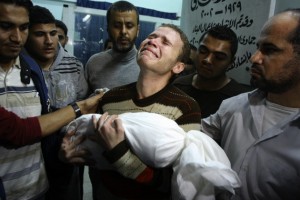 I just read an opinion piece in the New York Times about the Gaza situation called “Trapped in Gaza” by Lara Aburamaden.
I just read an opinion piece in the New York Times about the Gaza situation called “Trapped in Gaza” by Lara Aburamaden.
It begins with the simple line: “I don’t know how the story ends.” Aburamaden’s piece is almost heartbreakingly artful at a time when restraint and communication have gone out the window, in a region that is sorely in need of such things.
Lara writes of being at a Nordic Film Festival when word came that there had been an assassination:
But halfway in, just as Sebbe’s story began to arc, the reel stopped, just as surely as the world around me.A festival organizer interrupted the film and relayed the news: The Israelis, we were told, had just assassinated someone. There was already word of retaliatory rockets fired from Gaza. Things were going to get bad quickly, and we had better get home, where it would be safer.
So much is learned here. A Nordic Film Festival, the first of its kind, in Gaza. A rapt audience interrupted. Young people. Artists and intellectuals who must face death and destruction. Again.
Gaza. This is a human story as much as it is a political one. Aburamaden’s words bring to light the humanity of those who suffer there. Later in Aburamaden’s story we learn of a sister on the verge of her high school graduation and a bevy of siblings who sleep with furrowed brows.
 The author, described in the New York Times bio as a photographer and a student of English in translation, has brought Gaza home to me as I sit in my apartment in Park Slope, Brooklyn. I found some lovely photos of her’s on Flickr like the one at left of Gaza’s coastline and another one of a Turkish coffee pot on a grill.
The author, described in the New York Times bio as a photographer and a student of English in translation, has brought Gaza home to me as I sit in my apartment in Park Slope, Brooklyn. I found some lovely photos of her’s on Flickr like the one at left of Gaza’s coastline and another one of a Turkish coffee pot on a grill.
In another paragraph, the author comtemplates the horrific photograph at the top of the page, which she did not take. In it a man whose heart has been severed by the death of his not quite one-year old son, holds his child who is wrapped in white.
As I contemplate my own mother’s tired eyes, I wonder: What happens to those who lose a child? And will I ever see my own? So far, in the war that began on Wednesday, only a handful of children and teenagers have died. Hiba was 19, Omar a month shy of his first year on the planet. (Omar’s picture, I have since seen, made the rounds on Facebook. But he himself was wound in white and faceless, a corpse cradled by his wailing father.) As for Ranana, she made it to 5 before something very big and very loud fell from the sky, ending her time here. I don’t know her either. But then again, I do.
Words. Humanity. A transmission from a place few of us have ever been. Her thoughts are powerful, sane and impossibly artful at a time when even art isn’t enough to contextualize the human tragedy that is going on.
Each day here lays bare the ugliness of war, and for my siblings and me, each scene of our movie starts the same: we are trapped. And that is where our story begins and ends.
